Bow and Globe Town residents share their experiences of Ramadan
Ramadan is underway. To celebrate the occasion we spoke with Muslims in Bow and Globe Town about their experiences of this pillar of Islam. From favourite treats to spiritual vibes, here’s a peek at what goes on during this holy time.
Muzhakkir Ali
Muzhakkir is 17, attends Morpeth Secondary School, and lives near Globe Town Market.
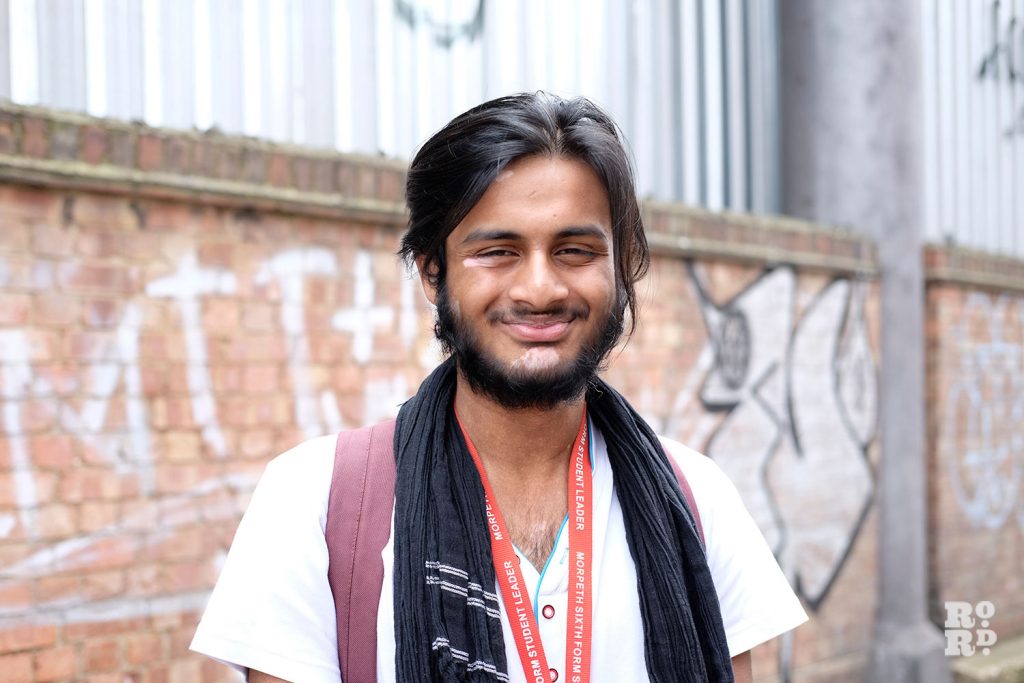
What’s your favourite thing about Ramadan?
A lot of people do say the vibe. The vibes are nice. Everyone comes together like a big family and you know you’re not by yourself. You have those people around you. It’s that nice feeling you feel when you’re together. I can relate, you’re in this too, we’re in this together, we’re bettering ourselves together. Knowing that gives you a heart-warming feeling.
What’s the worst thing?
The worst is when I’m not doing anything, when I’m not as active. I don’t get exhausted a lot, but sometimes I do and because of that I can’t function as well. I see Ramadan as a month to better myself and when I can’t do that because I’m exhausted, I feel bad. I feel like I’m not doing a lot.
It sounds like it helps that you’re kind of in it together
Yeah, it’s like a spiritual cleanse. In the prophetic tradition there is a saying that the devils are locked up, so it’s all on you. We believe that you are somewhat influenced by devils, and Ramadan is when they’re not yeah, and it’s on you. There’s an obligation, where whatever I’m doing that’s fully me. That’s me getting involved. I’m not being tempted by anyone or influenced. It’s personal.
Do you have a favourite passage from the Quran?
There’s a lot. There’s a passage where God says, For every hardship, there’s ease, and in the next verse the almost exact same thing is repeated. In the Quran we believe everything is there for a reason. God didn’t repeat himself for no reason. The fact that God is saying there is definitely ease after hardship, I find that reassuring. You don’t feel like everything’s bad. You know there’s light at the end of the tunnel and you’ve just got to see it through.
What bad habits are you hoping to break this Ramadan?
Not being as productive, I want to minimise that as much as possible. That’s going to require, when I wake up and before I start fasting, to have a healthy breakfast before I start fasting, and even at the end not to break it with fatty food. After a long day of fasting it’s best not to fill up on fried food. In Asian communities in particular we make samosas, kebabs, everything, and I want to have a more balanced, to eat food that gives me energy but does not exhaust me at the end of the day.
What’s your favourite food during Ramadan?
Chicken’s the go-to. Grilled chicken is really nice. Mainly chicken. I love my chicken. There’s also a dish with lentils and chickpeas that’s really nice as well and we have day to day. It’s more of a cultural thing, but it’s nice to have.
Do you play sports?
From time to time. Recently I got into swimming more. I got with my family and have a swim. It’s difficult to do that with Ramadan because the water may get in and break our fast. In general I’m fairly active and in Ramadan it drops a bit. I don’t want to be inactive but at the same time I also don’t want to exhaust myself. Finding that balance is something I’ve always struggled with, but I’m working towards that.
Have you come across any misunderstanding about Ramadan?
I think people have a rough view of what it is. I don’t think there are many misunderstandings. There’s one where on certain days girls can’t fast because when they’re on their menstrual cycle you’re not allowed to fast. I guess people ignore that aspect. There’s an assumption that everyone fasts every single day, but I think the exceptions are ignored a bit.
Sarah Choudhury
Sarah is 17 and attends Morpeth Secondary School.
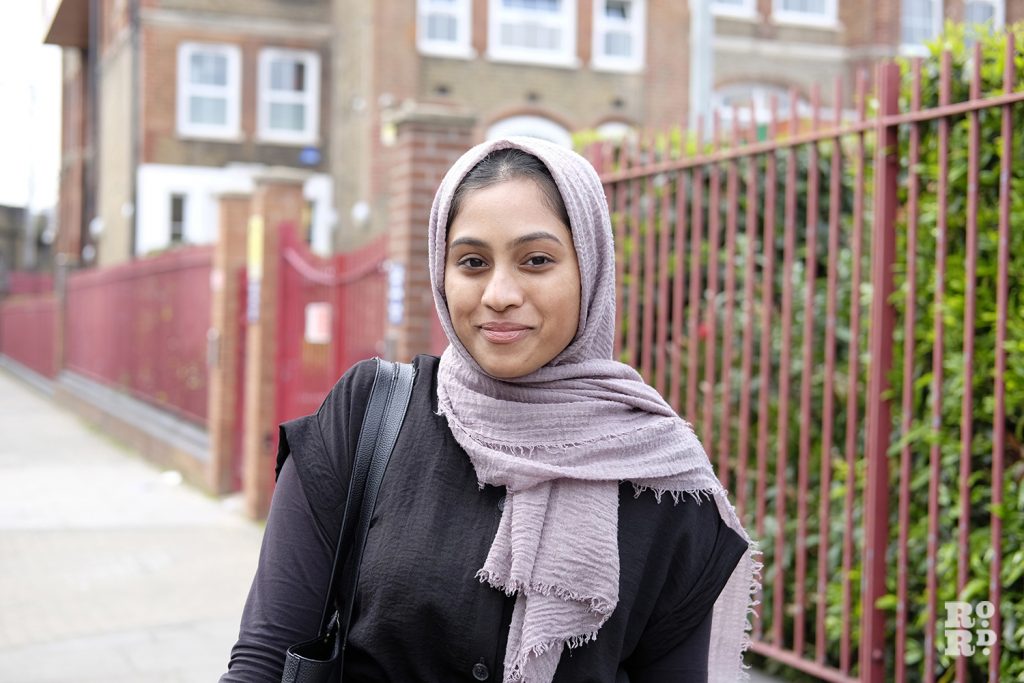
What’s your favourite thing about Ramadan?
I like the spiritual vibe and how everyone is together. Everyone is nicer I would say. There’s a focus. We try to be better people, there’s good vibes.
What’s the worst part?
Not being allowed to drink water in the heat. We’re not allowed to drink water so you get thirsty. It gets very hot.
If you had to explain Ramadan to someone from Mars, what would you say?
It’s 30 days of fasting from sunrise to sunset where you’re not allowed to drink or eat. You try to do a lot of good deeds during the days and throughout the whole month. It’s a spiritual cleanse.
What are you doing to celebrate Ramadan with your neighbours?
Normally we break our fast with a meal call Iftar which you usually give to your neighbours as a gift, or they can join in. You can give to charities and just try to be helpful.
Are there any special foods you have during Ramadan?
Samosas and spring rolls.
What misunderstandings do you get about Ramadan?
I haven’t come across a lot. I think it’s because I live in a very Asian community so I’m surrounded by people who know about it.
Do you have a favourite passage from the Quran?
I do. With hardship comes ease. I think a lot of people go through difficulties, even if it’s minor difficulties, it has an impact on people. It’s good to have that verse in your head all the time. It’s repeated twice actually, so it emphasizes that there is ease so you shouldn’t worry, just put your trust in God.
Do you get tired during Ramadan?
The first few days are the hardest because your body is not used to it, but after the first week I’m fine. I’m used to it and know how to manage my time.
What are you hoping to get out of this Ramadan?
Break a few bad habits. Not put them on pause, break them, so that after Ramadan I continue those good deeds. A bit more modesty. Throughout the year it gets a bit bad. And probably not listening to that much music because I have tried but it is hard.
Have you surprised yourself with what you’ve done during Ramadan before?
Yeah, yeah I have. I set a goal and if I can do it during it during Ramadan I can carry on.
Hamiyet and Dilek Alpetkin
Hamiyet, 49, and her daughter Dilek, 31, work at Stitches, a tailoring and alterations shop on Roman Road. Dilek translated for her mother.
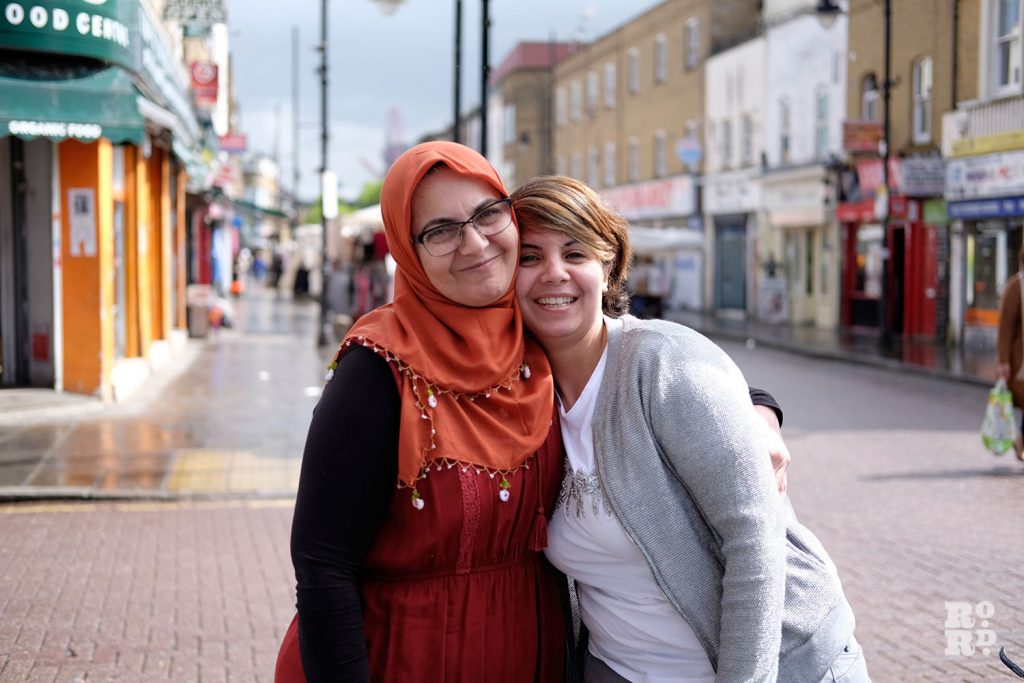
What’s the best thing about Ramadan?
Hamiyet: It’s like a gift where you appreciate a lot. The month is like a celebration. I love it. It’s a big part of my religion.
Right. It’s fasting but it’s also doing good.
Dilek: Exactly. Our prophet fasted and we follow what he has done. Ramadan is to celebrate that part of the religion, and realising the importance of positive thinking.
Is there a least favourite part?
Hamiyet: No, all good.
What misunderstandings do you get about Ramadan?
Dilek: Well when you say to people you’re fasting, if they don’t understand the religion part of it they assume, oh my god how can you starve yourself for that long, how do you do it? Actually you can’t think about the food part of it, it’s about the benefits of doing it. At the end of fasting we call it Eid which is a celebration of the whole month, families getting together, giving gifts, it’s nice.
What will you be doing to share with your neighbours?
Dilek: When we’re about to break fast we invite people round to enjoy that meal with you, so we take it in turns. If we invite people round for a meal, then someone else will invite us back. Then it’s about sitting round the table and enjoying the food.
Hamiyet: You tend to help the poorer families, giving donations. You end up feeding the poor as well.
Do you have a favourite passage from the Quran?
Hamiyet: I like all the passages. When I read the Quran I feel very comfortable, very positive.
Dilek: The main one she reads is called Yasin, which is six pages long. A lot of the stuff we do with our religion, we would read that. Say there’s a baby being born, or someone has died in the family, that’s the main thing that would be read.
What bad habits are you trying to drop this Ramadan?
Dilek: Well bad habits; you tend to stop doing any what we call sins – swearing, not praying enough, talking behind people’s backs. You forget about all the negative stuff during this time. Just praying constantly to appreciate. We pray 33 times, whereas normally it usually be four or five times a day.
Do you have any special treats during Ramadan?
Dilek: You have dates. When you first break your fast you either have dates or a glass of water. And then what we do is start with a starter, then a main course, then a desert so you have a full whack rather than one course.
Have you surprised yourself with the things you’ve not done during Ramadan?
Dilek: Not really. It should really be what we should always be doing, but Ramadan makes you realise that. You’re more careful during Ramadan, but really we should be doing these things all the time.
How is Ramadan different here than to at home?
Dilek: It’s very different here as you get a lot of different ethnicities, different religions, but in Turkey you hear the prayers so you know it’s time to break the fast. In the morning you get people going round with drums to say, right, it’s time to have something to eat and then you’re gonna start your fast. All the restaurants would be closed and they open just before fast is broken, so people enjoy it more. They put tables all outside because they know how busy it’s going to get.
Rohim Ali
Rohim is 41 years old and lives in Bow.
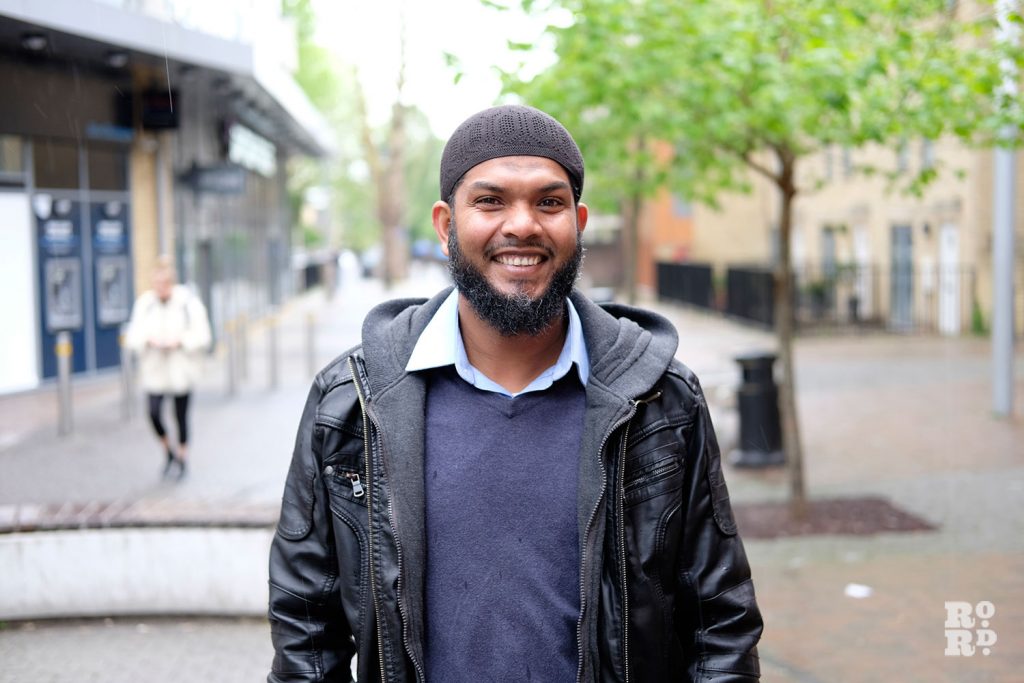
What’s the best thing about Ramadan?
It would have to be pleasing Allah. As Muslims we live to please Allah, and to do that you have to do good things. You can’t do bad things and make Allah happy. You feel a calmness, a lot of sincerity comes out, a lot of kindness and generosity. You see a lot of people giving to charity during Ramadan. And we’re not talking about thousands, we’re talking millions here. It doesn’t matter who you are, what you are. Whether you’re black, white, Chinese, Buddhist, Hindu, it doesn’t matter. If you need it, it’s there for you. When I give to charity I intend to give it to the whole world, to the needy. That comes out from me. It’s there in me now but Ramadan gives me a chance to express that.
What’s the worst thing about Ramadan?
For me, I don’t think there is anything ‘worst’ because it does nothing but good for me. It makes me a better person. It challenges me to be a better person. It brings the willpower out of me. The things I don’t think I can do, I can do. I can recite the Quran longer because I don’t have lunchtime or breakfast to worry about. I can focus my attention on other things, or spend it with families or friends or the community, whatever. For me Ramadan is nothing but good, good, good.
What will you be doing to share Ramadan with your neighbours?
What I’m doing now is a good example! Maybe moving misapprehensions from people, a lot of people understand the wrong things. Whether you’re a Muslim or non-Muslim, or a believer or non-believer, people need to sit down and think, these people starving themselves, it’s not for nothing.
What’s your favourite food during Ramadan?
You know, when you’re starting to fast any food is good! I like my dates. During the time of the prophet, he didn’t have big machines or research facilities, but dates have very, very good benefits. That’s why we were told break your Ramadan with dates and milk, and if you don’t have milk, water. I do love my dates.
What misapprehensions have you received about Ramadan?
I think it’s the idea that if you’ve not eaten you’ve done your bit. People forget Ramadan should be a month of goodness you do. That goodness blends so you can carry it for the rest of your life. For example, if someone’s a smoker and says, ‘I can’t smoke, I can’t smoke.,’ then how do you do it during Ramadan? How do you go without for 18 hours? It brings out strength like that. People who swear a lot, or are always angry or aggressive. If you think you can’t help, it’s inside you, it’s not. It’s a choice, and Ramadan helps you realise that. Although you think you can’t help it, you can. Ramadan is the proof. You might say I can’t give, I don’t have a lot of money, but during Ramadan you give naturally.
Absolutely, it’s about a lot more than fasting
It’s a big subject. What I’m giving here is not even a percentage of what there is to talk about.
All right, one more. What is your favourite quote from the Quran?
It would have to be Ayat Kursi. If you were to recite it, it feels very good. The meaning of it is very good. We get to know who our Lord is and who we are.
If you enjoyed this piece you may like reading about the experiences of women in Bow and Globe Town

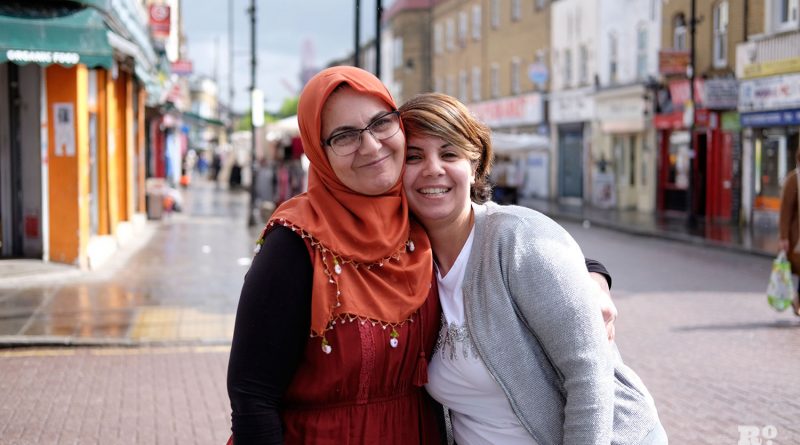

Great use of journalism. Fantastic piece Fred, very powerful and a huge thank you to all the Muslims for sharing.